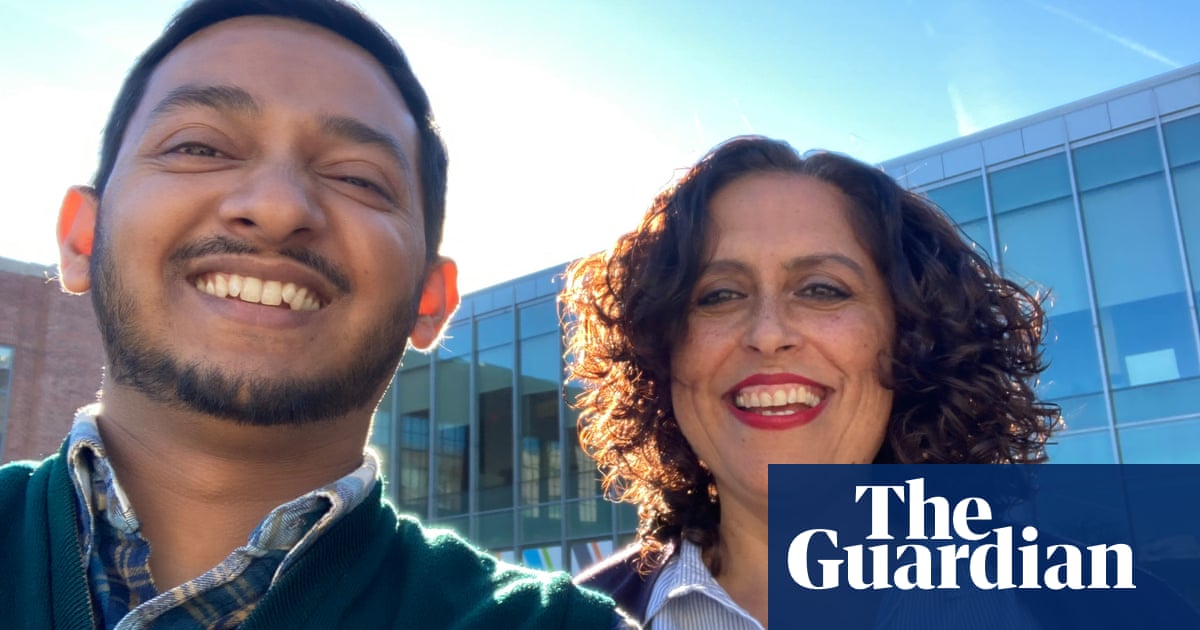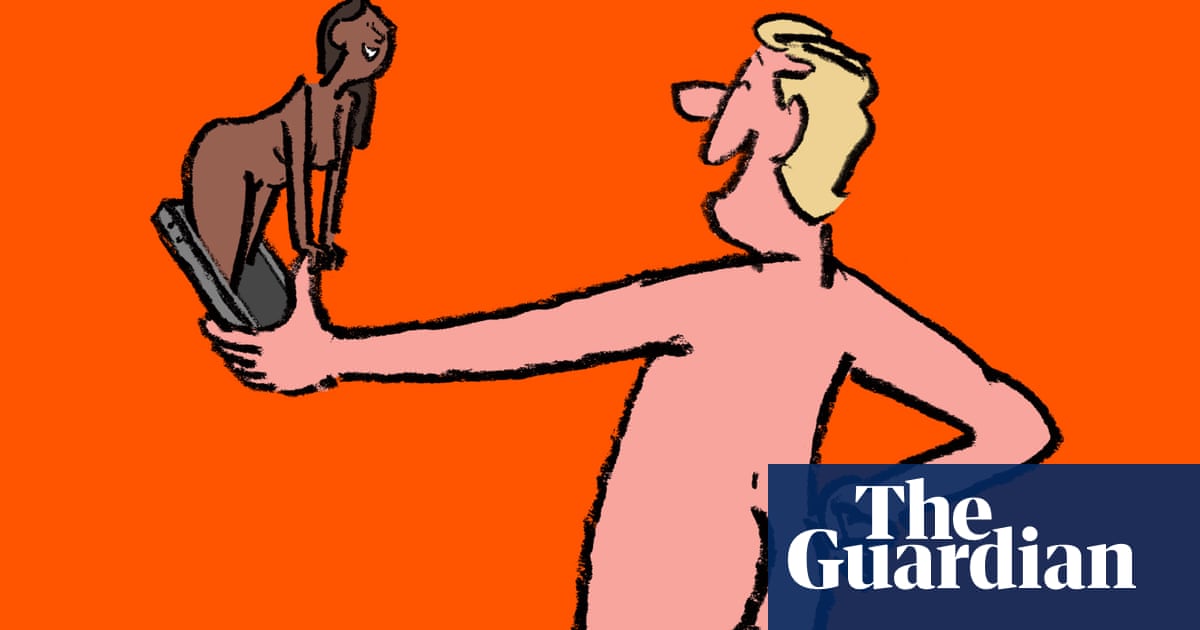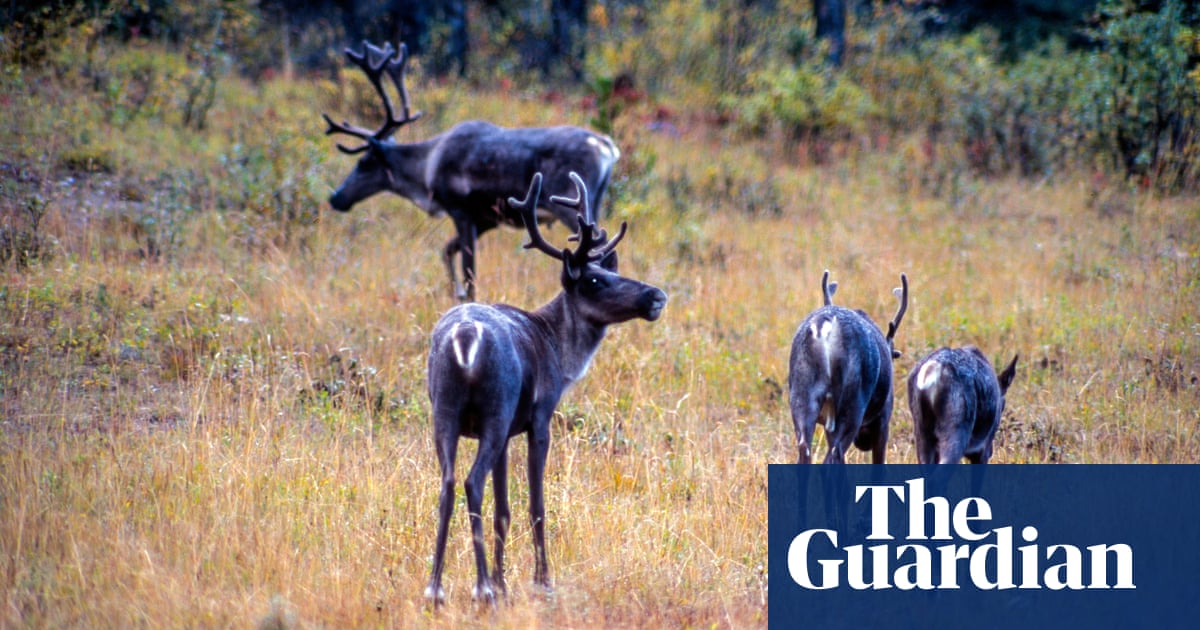
Names: Kaitlyn Bell and Todd Nimigon
Years together: 11
Occupations: student and program manager
“If you make one cup of tea, you’re in trouble,” quips Kaitlyn Bell. “That means you’re basically asking for a divorce.”
She and her husband, Todd Nimigon, have been through lengthy separations – including his six-month army deployment to Iraq during the battle for Mosul – as well as career changes and a tricky immigration to Australia. But, when it comes to maintaining their relationship, it comes down to a single action: “Two cups of tea instead of one,” says Todd with a laugh.
They met in their early 20s doing postgrad studies at the University of East Anglia in the UK. She’s American and was completing her masters in museum studies; he’s Canadian and was studying law. They were part of a big group of friends and, although there were a few memorable early encounters, it took a while for them to get together.
“It wasn’t some sort of ‘our eyes locked’ [moment]’,” says Kaitlyn. “It was like, ‘Wow, this is a really nice person, and we work really well together.’”
Although they had different interests, each recognised a kindred spirit in the other. They’d both moved around a lot as children and as adults, had both had left home to study abroad. “I think when you’re not used to putting down roots somewhere very long, you get more comfortable being a bit more spontaneous,” Todd says. Kaitlyn agrees, adding: “You have the same readiness to be up for anything … because the two of us had already done it. We’d already left our families. We’d already gone somewhere else.”
After graduation, they moved to Slough. Kaitlyn had a job as a warden at Windsor Castle and Todd decided he wanted to attend Sandhurst military academy and join the British army. It would mean long separations while he did his training, but she supported him wholeheartedly.
Looking back now, it was more challenging than they expected. The training was tough and they could only see each other every few weeks. Sometimes Todd’s home leave would be cancelled at the last minute if he’d committed a minor infringement. To keep his spirits up, Kaitlyn would send him a letter or a card each day, notes they still keep in a box somewhere. She insists these weren’t romantic epistles, just something to let him know she was thinking of him. “It brought me through it,” Todd says. “You didn’t have access to your phone mostly so that letter, that one little note you’d get was the only thing to keep you going.”
A few months in he proposed and they were married a few months later. They had a small service in London in August 2011. It was the same summer that the Duke and Duchess of Cambridge were married and, like Prince William, Todd wore his uniform while Kaitlyn wore purple. “We felt like royalty too,” laughs Todd.
Once he graduated from Sandhurst as an army lieutenant, they were moved into a four-bedroom house in Colchester. It was a big step up from their early life together. “We felt like we got very old very quickly because we were sitting on a married patch in the army in a garrison town.”
They discovered how traditional military life could be. “The man will work and be deployed and the wife stays home and manages the kids and the community in the married patch,” Todd says. “You could look out your window and see all the houses down the patch, you could see the junior lieutenants all the way to the senior colonels and you saw the timeline of your life on the street.”
It was hard on Kaitlyn. With Todd frequently away, she was often alone, with her own aspirations on hold. “As time goes on you have to figure out a way to cope,” she says. “I think every military woman goes into a new posting and says all right, what do I do? I have to find some friends. I got to find a job, find out where the gym, the pool and the running trails are. I got to find out where the library is. Is there a choir? Everyone’s got this checklist [because] I’m going to have to cope with being in the middle of nowhere, not knowing anyone, and I’m going to be by myself a lot of the time.”
She says while some partners thrived in the environment, buoyed by the close-knit community, and some managed to fit in their own careers; for others, it wasn’t sustainable. Todd agrees: “The army changes a lot of guys. It hardens them. They say there’s three people in the relationship, your spouse and the army – and yourself and the army always wins but your wife comes a close second.”
After two postings, it was time for something new and the couple decided to move to Australia, a country they’d visited briefly and fallen in love with. But leaving the army required a year’s notice, and Todd was still to complete his major deployment. He was swiftly assigned. “I had a phone call with my parents [in Canada]. In one phone call I said, ‘Mom, Dad, guess what?’ I’m deploying to Iraq, I’m leaving the army, and I’m moving to Australia.’ There was silence on the phone.”
Todd spent six months in Baghdad. He was appointed the chief logistic adviser to the Iraqi army just as the battle for Mosul began. It was a busy and stressful time but he had been trained to deal with the situation. “You’re there for a particular purpose and they haven’t brought you there unprepared,” he says. “You’re part of a big coalition force and you genuinely think that you’re there as a force for good, because … you’re fighting Isis … I felt like I was on the frontier of civilisation. This is the place that was supposed to be the birthplace of civilisation and now it’s the edge of it. I was there working alongside the Iraqis trying to play my small part of a huge plan, make it a better place for them.”
At home, Kaitlyn had to get on with things too. She tried not to let worry overwhelm her: “Todd went into a little box in my brain that was at the back. I would open up that box at certain points of the day or the week and I would think about it and explore those feelings and then I would put it away … I thought, if I have a meltdown I’m going to be no good to Todd who’s in the middle of a war zone.”
She busied herself with the huge task of moving their lives to Australia.
The couple were reunited at Sydney airport. Excited as they were to be together again, it was a readjustment for both. “You spend so much time coping with them being gone, having them actually present is really odd,” says Kaitlyn, “and so you have to relearn how we work as a couple.”
Todd went through his own readjustment to post-military life. “I remember after having all this responsibility, pressure and world news happening around you, I joined a consultancy business and they’re like, ‘That PowerPoint slide, make it more blue.’”
Gradually they settled into normal life in Australia. Kaitlyn is retraining in zoo keeping and works at Taronga zoo as a carnivore keeper, while Todd works for Atlassian as a program manager. Being independent has stood them in good stead. “Our foundations are very similar … but essentially we’re two very different people who like very different things and are very content in our own company,” Kaitlyn says.
They give each other plenty of space to pursue their own interests. “I often say, ‘I’m going to give you the gift of my absence for six hours,’” says Kaitlyn, “because our jam is respecting that the other person has other friends, another job, other things they’re interested in and maybe really wants to be by themselves for a bit. At the start of a relationship, you’re on top of each other. But if you’re going to be doing it for the long haul you need to figure out who you are, what you want [and] what you’re interested in.”
They also spend plenty of time together, walking, talking and planning their next adventures. “We’re constantly thinking of what’s the next trip or thing we can do together –which is not possible right now,” Todd says. “We always want to do something active, outdoors and something we can do together.”
Helping the other realise their own potential is important too. “We are constantly trying new things together and trying new challenges together, which deepens your integrations and collective history with each other. With the military career, I wouldn’t have got through if she wasn’t supporting me and challenging me and then at the same time I made the decision to end that career and come here, so she can have and grow her experience.”
He adds: “When one of us comes up with an idea we don’t shoot it down, and we see where it leads us. Now we’ve lived in so many countries and had all these adventures and we’ve got a lot of cool stories to tell. It’s the length of the journey, not necessarily the destination. And if we feel like we’ve found ourselves in a really bad spot or we’re unhappy, we also realise that nothing’s permanent.”
For them, demonstrating their love comes down to small gestures like walking the dog together or cooking a favourite meal. “Reality isn’t sweeping gestures,” says Kaitlyn. “Maybe once every six months, a sweeping gesture would be all right. But for day-to-day, you better make a second cup of tea.”
• We want to hear your stories about staying together. Tell us about you, your partner and your relationship by filling in the form here












